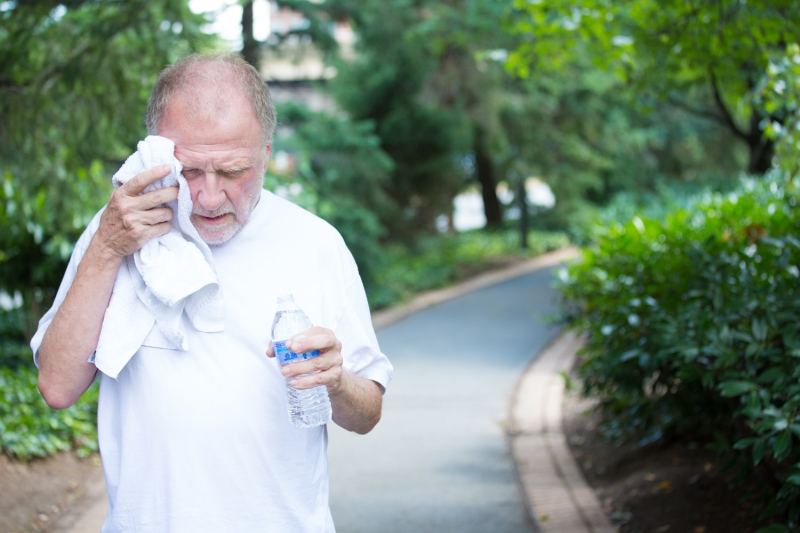Check on older loved ones as weather heats up

As temperatures across Victoria climb, health experts are reminding everyone that heat can cause serious illness and death.
Alfred Health’s Director of Rehabilitation, Aged & Community Care, A/Prof Peter Hunter, said older Victorians are among the vulnerable when temperatures soar.
“Older people have less physiological reserves. On really hot days, younger people can effectively sweat, get thirsty early, shed clothes quickly. When older people get hot their body is less able to respond and therefore they are more likely to develop a higher body temperature,” A/Prof Hunter said.
People over 65, particularly those who are on medication for blood pressure and heart complications or taking antihistamines, diuretics, antidepressants and antipsychotics, are at a higher risk. These medications all affect the way the body reacts to heat.
“A symptom of heat stress is confusion and disorientation, which can lead to falls and fractured bones.
“We need to keep an eye out for our older loved ones so, if you know you have older neighbours, just pop over and say hi.”
New Year fitness resolutions
Despite the good intentions of many people to increase fitness in 2018, scheduling outdoor workouts on hot days can quickly lead to trouble. The two main issues are rapid dehydration and an inability to cool down your body's temperature.
Director of the Emergency & Trauma Centre at The Alfred, Dr de Villiers Smit, said people who are working or exercising outdoors during very hot weather are at a higher risk of suffering heatstroke because their sweat can’t evaporate fast enough to keep the body at 37°C.
“We do see people exercising in high 30 and 40 degrees, and your ability to sweat and to maintain fluid balance is compromised,” he said.
While resting in comfortable temperatures, a person sweats about two litres of fluid every 24 hours. During hot weather (35°C), this fluid loss can leap to around 10 litres over the same time period. Heat exhaustion can creep up on you in the hours after you exercise and, if not treated, can develop into heatstroke.
“Some people don’t realise until it’s well advanced. People do die from heat exhaustion, the body temperature is too high and it can lead to kidney failure and other organ failure.
“The average runner in Melbourne is not acclimatized to exercising in hot weather, so scheduling outdoor activities in the early morning and evening is advised,” de Villiers said.
What to look out for
The body exhibits specific symptoms when suffering from heat exhaustion, these can include: muscle cramps, dizziness, nausea, vomiting and fainting.
“It doesn’t take long for the body to start shutting down in hot weather, so watch out for high body temperatures, dry lips and dehydrated skin, confusion and disorientation,” de Villiers said.
Tips to survive the heat
There are a number of ways to keep the body cool and hydrated:
- Drink at least two litres of water a day and more if you are sweating.
- Spend as much time as possible in cool buildings (shopping centres, libraries, cinemas or community centres).
- Consider visiting a friend who has air conditioning if you don’t.
- Never leave kids, adults or pets in hot cars. The temperature inside a parked car can double within minutes.
- Block out the sun at home during the day by closing curtains and blinds.
- Take cool showers and sit in front of a fan.
- Avoid intense activity like exercise, renovating and gardening
- Stay out of the sun.
- If you must go out, wear a hat and sunscreen and take a bottle of water with you.
- Plan ahead - schedule activities in the coolest part of the day
- Help others - look after those most at risk in the heat – your neighbour living alone, the elderly, the young, people with a medical condition and don’t forget your pets.
For more on information on how to stay cool this summer, visit the Victorian Government’s Better Health Channel or subscribe to the Chief Health Officer's extreme heat alerts.


